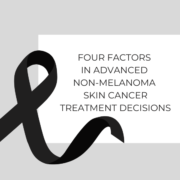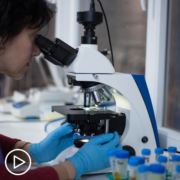Four Factors in Advanced Non-Melanoma Skin Cancer Treatment Decisions
How can non-melanoma skin cancer treatment be determined? In the “Advanced Non-Melanoma Skin Cancer Treatment Decisions: What’s Right for You?” program, expert Dr. Vernon Sondak from Moffitt Cancer Center shares factors that help determine non-melanoma skin cancer treatment for the best care.
1. Establish Treatment Goals
Depending on each advanced non-melanoma skin cancer patient, treatment goals may vary. Advanced non-melanoma skin cancers are often curable. With some patients, curing them may not be the primary goal – but making the patient feel better by reducing their symptoms may be the goal of their care. The end result in those cases is improved quality of life for these patients. Work together with your healthcare team to understand your treatment goals.
2. Learn About Factors That Help Determine Treatment Options
Depending on each skin cancer patient, treatment options may vary depending on the factors of patient lifestyle, overall health, other medical conditions, and patient concerns. Lifestyle factors can include things like sun exposure and sun protection after diagnosis and whether the patient is a smoker, since smoking can impact health in various ways.
3. Ask About Available Treatment Options
Advanced non-melanoma has a wide range of treatment options, which may include a combination of radiation, surgery, chemo, immunotherapy, and targeted therapy. Sometimes radiation or another treatment may be used before surgery to shrink the tumor or tumors. Or surgery may not be used at all. Make sure to ask your doctor about the treatment options and why one of the types is not part of your treatment plan to ensure you have a thorough understanding of your care plan.
4. Consider a Panel of Specialists
Advanced non-melanoma skin cancer is a cancer that is best treated by an experienced team of specialists. The ideal situation is to have a radiologist, surgeon, and oncologists who can coordinate with each other to carry out the best combination of radiation, surgery, chemo, immunotherapy, and targeted therapy. By working together, the team of specialists can work out the best treatment timing and combination for the optimal patient outcome.
It’s vital for advanced non-melanoma skin cancer patients to learn about the factors involved in treatment decisions. By expanding their knowledge, patients can help determine the best treatment plan for improved quality of life and optimal health outcomes.






![[ACT]IVATED AML [ACT]IVATED](https://powerfulpatients.org/wp-content/uploads/ACTIVATED-AML-180x180.png)



